Sonil Dedhia in Mumbai
Looking pretty in her orange kurta, Kiran Rao is ready to give her final interview for the day.
The debutante director puts on a big smile, and settles down to answer questions about Dhobi Ghat, a film starring Prateik Babbar, Monica Dogra, Kriti Malhotra and husband Aamir Khan.
Rao also told Sonil Dedhia her experience of Mumbai city, and of course, being Mrs Aamir Khan.
What inspired you to make Dhobi Ghat?
I wanted to make a film and was searching for a subject. Mumbai inspired me. It's a very interesting subject because it is as complex as a character. There are so many cities within the city. If you really want to experience this city, you'll have to stay in each locality because each of them have their own language, culture, food, flavours...
Also, the people in the city make it so special. The common people who drive the city, people in trains, on roads, sitting by the sea. On the whole, Mumbai is like a muse for me.
Don't you think Mumbai Diaries would have been a better title considering Dhobi Ghat is just a metaphor?
I prefer Dhobi Ghat, as it captures what I want to say about the film and about the city. It also has a link to one of the characters who is a dhobi.
Mumbai Diaries was the title we had thought of when our film got an official selection in the Toronto International Film Festival because international festivals always need an English title so that people can relate to the film.
'Mumbai has always inspired me'
Image: A scene from Dhobi GhatYou've grow up in Kolkata. How did you manage to capture Mumbai?
I went to college here, from 1992 to 1995, and really explored the city then. It was a new place after 18 years in Kolkata. As soon as I came here, I felt at home. When I went to Delhi to do my Masters degree, I wanted to come back.
I think the look and content comes from the fact that I love this city and want to explore it well. I find the city inspirational in many ways. It's a dynamic city which has got a life of its own. That's how I though of it as a character in my movie. I know Kolkata very well but not Delhi as much. But this was the city that really inspired me.
You have used multiple formats to shoot the film. How different was the experience?
That was one of the ways I wanted to show different ways of perceiving the city. It was very important for the film that it shouldn't be a straight-line narrative. I wanted a kind of collage of the city, so I thought it would be interesting to make it visually different, as you may see the city different from the way I do.
So we have this character Shai (Monica Dogra), who comes from America. Her black and white photographs reflect a certain beauty. Then there's Yasmin (Kirti Malhotra), who comes from a small town in Uttar Pradesh, and she films things in her video recorder that Monica would never been interested in. Each character is reflected through a medium, and that gives a textured view of the city.
'I did not show the high-rise buildings of Mumbai nor did I show the Queen's Necklace'
Image: A scene from Dhobi GhatEvery debutant director wants to show their personal experiences in the film. Have you done that too?
There is a lot of me in the film, in terms of sensibilities. If you are talking of direct experiences, Aamir's character in the film -- who shifts from house to house -- is what I can relate to.
The film is fiction, but the characters and their experiences are coloured with what I have encountered in the city. But they are not direct. I had to shift to a new apartment almost every year. I started connecting in a strange way to the people that had lived in the space before me and would thereafter. What if they had left behind something that would reveal their life and secrets?
The second thing was to examine whether it's possible to highlight differences between the rich and the poor. I wanted to see what it would be for an upper class girl to have a relationship with a boy from a poor background.
My film is about four characters, whose lives intersect at some point of time and whose relationships affect each other. It's also about the city, which finds a way into their lives.
You shot in places that are not beautiful in the conventional sense.
It's interesting you say that because everybody says that it is highly unconventional to shoot at these locations.
I wanted to portray the city in all its vibrance and complexity. I did not show the high-rise buildings of Mumbai nor did I show the Queen's Necklace. Those weren't a part of the narrative. The narrative lies in the small gullies of the city and the old buildings where new towers are coming up.
People may have seen many shots of Mohammed Ali Road (South Mumbai) but I don't think any film has shown Ramzan being celebrated at the Minara Masjid. I chose to shoot at these places because I wanted to show the inner city where people usually don't venture into.
'When I first came to the Mumbai, I had no dreams'
Image: A scene from Dhobi GhatMunna, as a character in the film, dreams of becoming an actor. What did Kiran Rao dream of when she came to Mumbai?
When I first came to the city, I had no dreams.
I knew I wanted to do something in the arts, but didn't know what. I loved music, acting, writing and fine arts, but didn't know much about movies. I did my masters degree in Mass Communication from Delhi, where we watched documentaries, and films by Akira Kurosawa, Federico Fellini, Michelangelo Antonioni and other great filmmakers. That's when I felt that this was something I want to do.
So when I came back to Mumbai in 1998, I convinced myself that I wanted to become a director. That's how my assistant director days started.
What did you learn during your AD days, when you worked on two very different films: Monsoon Wedding and Laagan?
It was exactly what I wanted!
Each filmmaker is different and I learnt so many things from Ashutosh Gowariker and Mira Nair. Assisting was the best learning experience. Right from managing the crew, to how to get the best out of your cast, to managing your resources... it gave me a good foundation to stand on.
'Aamir was very keen on me playing a part in the film'
Image: A scene from Dhobi GhatThe whole aesthetics of the movie changed once Aamir came on board.
I have to keep telling people that don't expect an Aamir Khan film because this film is not the kind of film he usually does. We consciously decided that this film should not be known as an Aamir Khan film because we didn't want to cheat our audience by saying that.
You were reluctant to cast Aamir...
Aamir always liked the script and wanted to be a part of it. We were conducting workshops with theatre actors and I had almost finalised somebody for Arun's role. But I was not fully convinced.
Aamir came to me and told me to screen test him. I did and thought he was perfect for the role. I hesitated to cast him because I wanted it to be a small film, work with a small crew and unknown faces. The reason was that was I wanted to shoot at real locations, and it would have been difficult to shoot with a big star on the crowded streets of Mumbai.
Aamir convinced me that they would shoot at the same places in the middle of the night since most of Arun's scenes are in a house. He rented a one-room-bathroom house in a chawl, where we shot for almost a month and did not step out during the whole process. All our meetings would take place inside the house.
By casting Aamir, I have certainly extended my audience. But I'm optimistic that even without him, there would have been an audience, even if it was smaller.
Apparently, he wanted you to act in the movie too, and wanted you to play Yasmin.
He was very keen on me playing a part in the film. But I didn't want to divert my attention to two different things at a time.
'I wouldn't like to work with other banners'
Image: Aamir Khan and Kiran RaoPhotographs: Pradeep Bandekar
What suggestions did Aamir give you, if any?
I was clear on how I wanted to shoot the film and he understood it very well. Aamir has been there and done that, so I had the benefit of his experience. Whenever he gave me suggestions, I always listened and tried to analyze that. I was open to suggestions from all my crew members. Everybody contributed equally.
A large portion of the film is in English. Would that not restrict your audience?
Everyone thought that 40 percent of the film is in English. There are about 12 scenes in English, which must be around 20 percent of the film. We're having a Hindi version because some people don't know English and don't want to further narrow down our audience.
Would you ever consider directing a film for an outside banner?
I'd like to work with Aamir Khan Productions. It's my company; I'm its director and very comfortable with it. But even otherwise, I wouldn't like to work with other banners. I couldn't have asked for better work circumstances because Aamir Khan Productions have always made quality cinema, and Aamir and I believe in doing what we like to do. For us, filmmaking is a passion and not a business.
'I would like people to know me for who I am'
Image: A scene from Dhobi GhatWhat's the best compliment you've for Dhobi Ghat?
In my very first screening at the Toronto film festival, a lady in the audience said she just loved the film and that she wanted to move to Mumbai the next day!
Have you settled into the life of stardom? Are you comfortable with it?
I have settled down and am loving it. I have formed my own identity now.
I wasn't very comfortable being only known as Aamir Khan's wife because I've always felt that when I have something to say or contribute, that's when I want to known in public.
I happen to be married to Aamir. So I am in the limelight because people love him so much that they want to know who he is married to, what work he's doing etc. I'm comfortable with the curiosity factor now. But I would like people to know me for who I am.
'I haven't seen all of Aamir's films'
Image: Aamir Khan and Kiran RaoWhat are the three things you like about Mumbai?
The people. They make the city what it is and give the city this remarkable energy.
The old buildings and architecture because they give a lot of character and beauty.
The local trains because that's a lifeline, and one of the defining things of the city.
The things that you hate about Mumbai.
I hate the growing apathy towards the city. People have stopped caring.
I hate the civic authorities's failure to deliver better public facilities.
Your favourite Aamir film?
Taare Zameen Par. It had a very fine script and I enjoyed working on it. Also, it helped change people's perspective towards child care and education, and the attitude towards children with difficulties.
One film you think Aamir shouldn't have done?
I haven't seen all of his films. I've loved the ones I've seen. Once I see all of them, I'll contact you and let you know. (laughs)

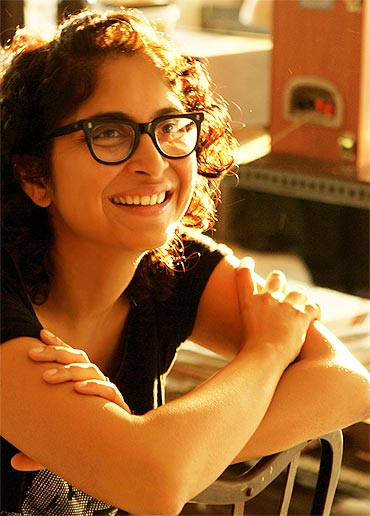
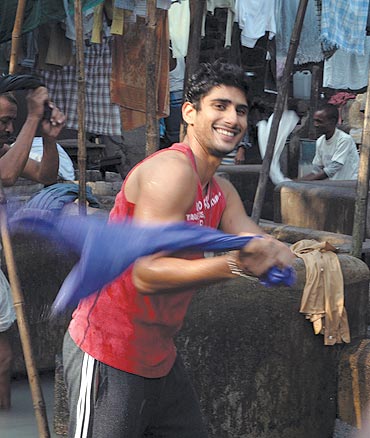
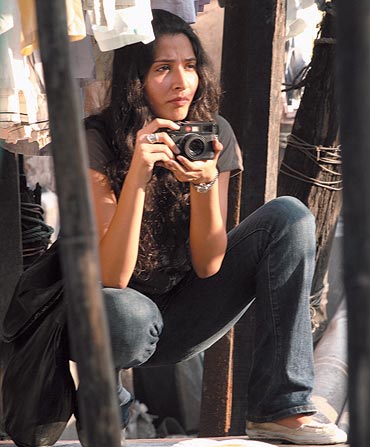
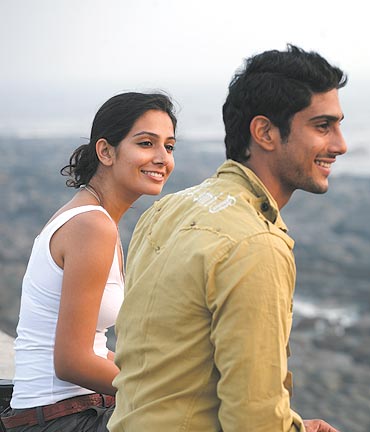
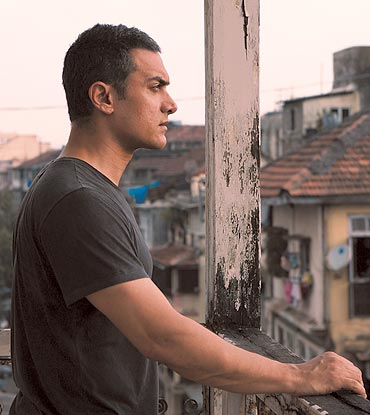
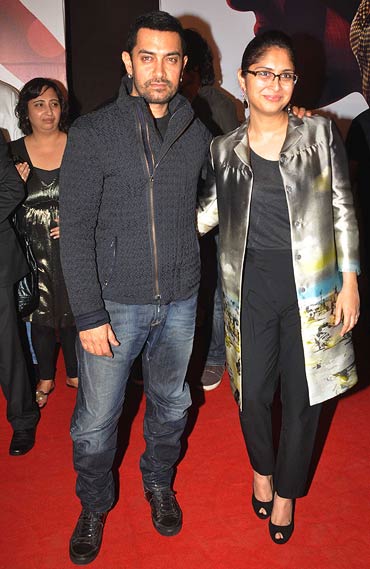

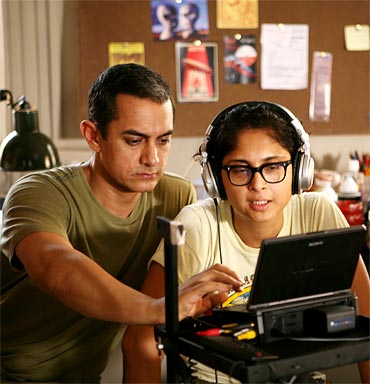
Comment
article